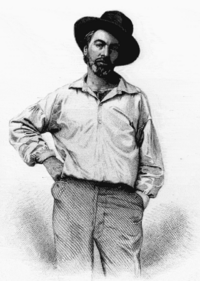Leaves of Grass facts for kids

Walt Whitman, age 37, frontispiece to Leaves of Grass
|
|
| Author | Walt Whitman |
|---|---|
| Country | United States |
| Language | English |
| Genre | Poetry |
| Publisher | Self |
|
Publication date
|
July 4, 1855 |
| Media type | |
Leaves of Grass is a collection of poetry by American writer Walt Whitman (1819–1892). The collection was first printed on July 4, 1855 in Brooklyn at a Fulton Street printing shop. About 800 copies were printed. The book was 95 pages long and had 12 poems. Whitman paid for this first printing. Sales of the book were few, but Whitman was not discouraged.
One paper-bound copy was sent to Emerson, who had initially inspired its creation. Emerson responded with a letter of heartfelt thanks, writing, "I find it the most extraordinary piece of wit and wisdom America has yet contributed." He went on, "I am very happy in reading it, as great power makes us happy."
Whitman spent most of his professional life writing and rewriting Leaves of Grass, revising it multiple times until his death. There have been held to be either six or nine individual editions of Leaves of Grass.
The most famous poems in the book are "Song of Myself", "I Sing the Body Electric", "Out of the Cradle Endlessly Rocking", and "When Lilacs Last in the Dooryard Bloom'd". The collection praised the human body, the material world, nature, and the experience of the senses at a time when poetry focused on religious experience and the life of the spirit.
By the time this last edition was completed, Leaves of Grass had grown from a small book of 12 poems to a hefty tome of almost 400 poems. As the volume changed, so did the pictures that Whitman used to illustrate them—the last edition depicts an older Whitman with a full beard and jacket.
Its status as one of the more important collections of American poetry has meant that over time various groups and movements have used Leaves of Grass, and Whitman's work in general, to advance their own political and social purposes. For example:
- In the first half of the 20th century, the popular Little Blue Book series introduced Whitman's work to a wider audience than ever before. A series that backed socialist and progressive viewpoints, the publication connected the poet's focus on the common man to the empowerment of the working class.
- During World War II, the American government distributed for free much of Whitman's poetry to their soldiers, in the belief that his celebrations of the American Way would inspire the people tasked with protecting it.
Images for kids
-
Frontispiece of the 1883 edition
See also
 In Spanish: Hojas de hierba para niños
In Spanish: Hojas de hierba para niños


